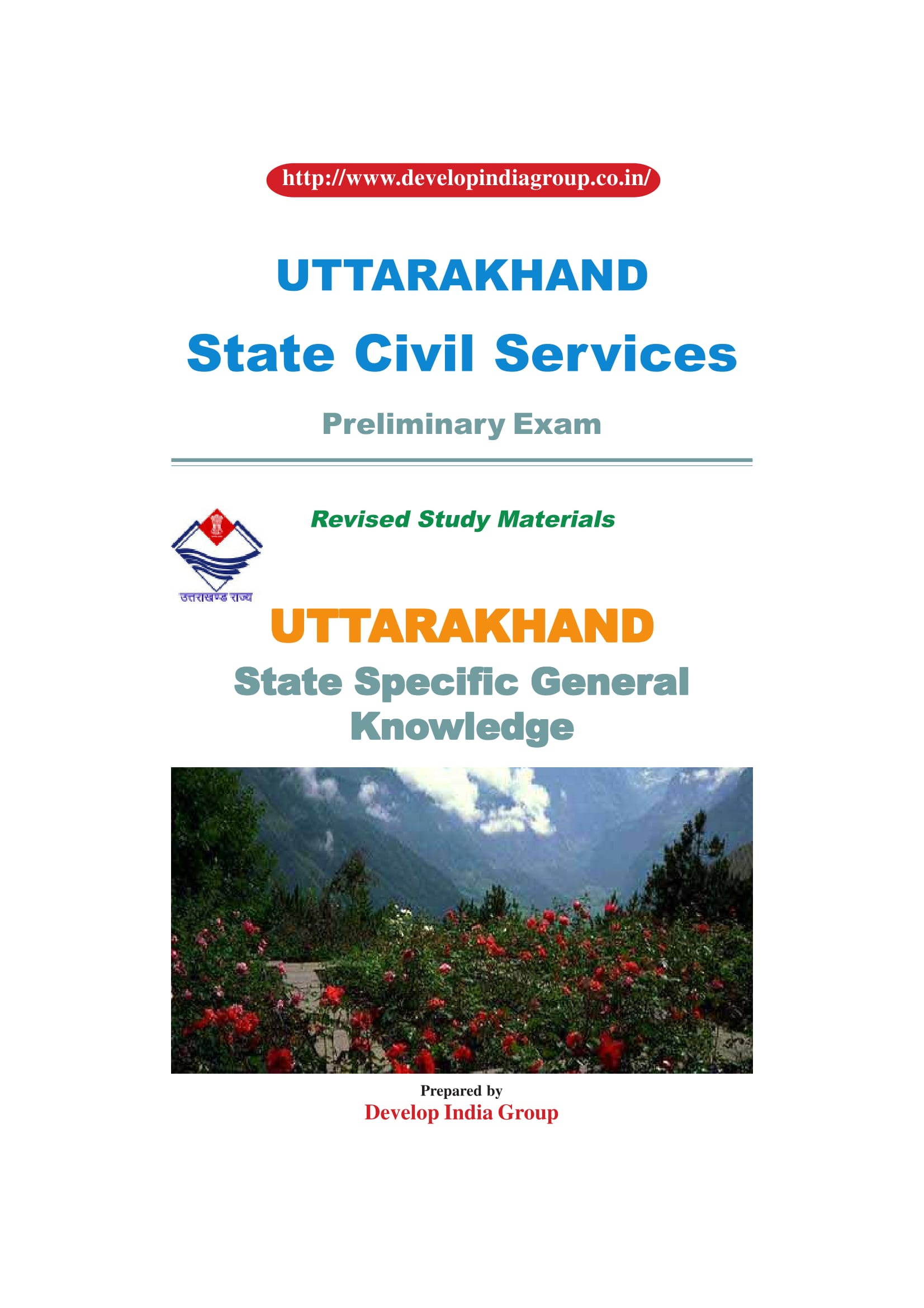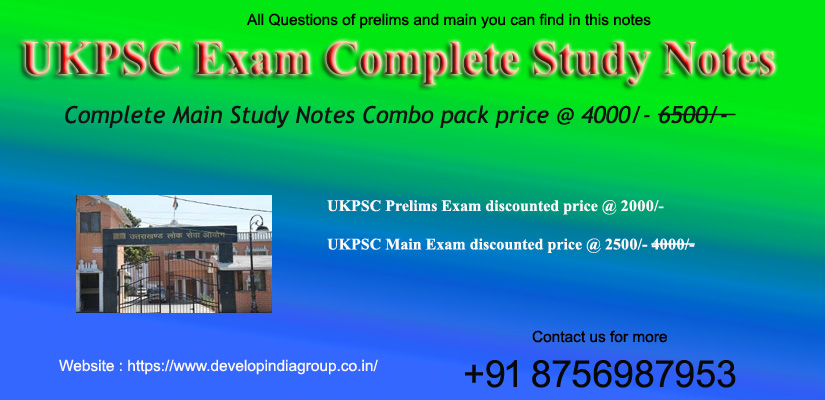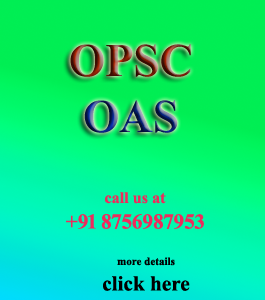UKPSC Complete Study Notes 2023
Uttarakhand Public Service Commission (UKPSC) is a major body conducting examinations and recruitment at various Departments of Uttarakhand Government as well as State Civil Services. UKPSC conduct various recruitment examination in Uttarakhand for Govt Department and State Civil Services.
UKPSC organize Uttarakhand PCS (UKPCS) exam along with filling of posts of Group B, Group C, Review Officer, ARO, Stenographer, High Court Staff, Computer Operator etc. Get latest UKPSC recruitment notifications and vacancy in different Government departments in Uttarakhand. Find all the latest recruitment updates by UKPSC. Check out various Government job and recruitment details of UKPSC or UKPCS.
Combo Pack Price : Rs. 4000/- Buy Now
| Download Notification/Result | Previous year Question Paper |
| Download Syllabus | Latest Update |
Our Study Notes Prepared by : Selected competitors, retired professors, and senior competitors more than 10 year experience
.jpg)
.jpg)

.jpg)
.jpg)
.jpg)
.jpg)
.jpg)
.jpg)
.jpg)
.jpg)

Examination Pattern and details
Uttarakhand Public Service Commission exam is conducted in three level : preliminary, mains and Interview.
UKPSC Exam Pattern
Preliminary Exam (Objective type)
Paper 1 : General Studies; 150 questions (1 marks each ques.); 150 marks; Timing - 2 hour
UNIT-I
Indian History, Culture and National Movement; Pre-Historic Period; Mauryan Empire; Gupta Empire; Post-Gupta Period
Advent of Islam in India; Mughal Empire; Advent of Europeans; Indian National Congress; First World War & Indian; National Movement; Government of India Act 1935; History and Culture of Uttarakhand; Pre-historic Period.
Proto-historic period.
Ancient tribes of Uttarakhand; Kuninda and Yaudheya; Kartikepur dynasty; Kattyuri dynasty; Parmar dynasty of Garhwal; Chand dynasty of Kumaon; Gorkha Invasion and their rule in Uttarakhand; British RuleTehri Estate; Freedom Movement in Uttarakhand- First war of Independence (1857) and Uttarakhand; Role of Uttarakhand in India’s national movement; People’s movements of Uttarakhand
UNIT-II
Indian and World Geography
Geography of world Important Branches; Earth and Solar System; Lithosphere; Latitudes; Longitudes; Time; Rotation; Revolution; Eclipses; Continents; Mountains; Plateaus; Planes; Hydrosphere; Lakes and Rocks; Atmospheric layers; Composition; Isolation; humidity;
Geography of India
Geographic Introduction; Relief and Structure; Climate; Drainage system; Vegetation; Plants; Insect; Livestock breeding; Irrigation; Power; Soils; Water Resources; Geography of Uttarakhand; Geographical location; Relief and Structure; Climate; Drainage system; Vegetation; Wild lifel; Minerals; Agriculture; Animal Husbandry; Irrigation; Major Cities and Tourist Places; Populations
UNIT-III
Indian & World Polity; Indian Polity National & International; Constitution of India; Panchayti Raj; Public Policy; Issues Concerning Rights; Political System of Uttarakhand
UNIT-IV
General Science and Technology; Science and Technology in India; Current Affairs; Ecology and Environment; Physical Science/Awareness; Life Science; Scientific Glossary
UNIT-V
Current events of State, National and International Importance
Paper 2 : General Knowledge; 100 questions (1.5 marks each ques); 150 marks - Timing - 2 hour
2. General Aptitude
UNIT-I
Reasoning & Mental Ability; Aptitude; Logical & Analytical Ability; Decision; General Mental Ability; Numerical Identifications; Statistics Analysis.
UNIT-II
General English & Hindi Language Proficiency; Vocabulary; Antonyms; Synonyms; One-word substitution; Phrases/phrasal verbs; Transformation of sentences.
UKPSC Main Exam (Written Exam)
1st Paper : Language 3 hour 300 mark
2nd Paper : Indian History & National Movement, Social & Culture 3 hour 200 marks
3rd Paper : Indian Administration, Social Justice & International Relations 3 hour 200 marks
4th Paper : India Geography & World Geography 3 hour 200 marks
5th Paper : Economic & Social Development 3 hour 200 marks
6th Paper : General Science & Technology 3 hour 200 marks
7th Paper : General Interest & Ethics 3 hour 200 marks
Interview : 200 marks
Total Marks 1700
UPSC Mains Syllabus
Language Papers (Indian language and English)
प्रथम प्रश्न पत्र (भाषा)
समयावधि – 03 घण्टे पूर्णांक – 300
सामान्य हिन्दी, सामान्य अंग्रेजी एवं निबन्ध लेखन
राजभाषा परिनियमावली (संक्षिप्त परिचय) – 10 अंक
शब्द रचना – 25 अंक
(i) उपसर्ग एवं प्रत्यय
(ii) संधि एवं समास
(ii) वचन एवं लिंग
(iv) व्याकरणिक कोटियां – संज्ञा, सर्वनाम, क्रिया, विशेषण, क्रिया-विशेषण,अव्यय (परिभाषा एवं भेद)
(v) वाच्य परिवर्तन (कर्तृवाच्य/कर्मवाच्य/भाववाच्य)
शब्दविवेक – 25 अंक
(i) शब्दभेद
क- तत्सम, तद्भव, देशज, विदेशी, संकर
ख- रूढ यौगिक और योगरूढ
ग- पर्यायवाची, समानार्थी, विलोम, अनेकार्थी, समूहवाची, समरूप किन्तु भिन्नार्थक, पारिभाषिक, शब्दयुग्म, वाक्य या वाक्यांश के लिए एक शब्द, संक्षिप्ताक्षर
(ii) शब्द शुद्धि
वाक्य रचना – 10 अंक
(i) रचना के आधार पर वाक्य परिवर्तन (सरल, मिश्र एवं संयुक्त)
(ii) व्याकरण के आधार पर वाक्य परिवर्तन (प्रश्नवाचक, विस्मयादिबोधक, सकारात्मक, नकारात्मक)
(iii) विरामचिह्न
(iv) वाक्यशुद्धि
(v) स्लोगन लेखन
भाषा का मानकीकरण – 10 अंक
(i) वर्तनी का मानकीकरण
(ii) व्याकरण का मानकीकरण
(iii) लिपि का मानकीकरण
(iv) उच्चारण का मानकीकरण
लोकोक्ति एवं मुहावरे – 10 अंक
अपठित गद्यांश (हिन्दी) – 15 अंक (2+5+8)
(i) शीर्षकीकरण
(ii) भावार्थ
(iii) रेखांकित अंशों की व्याख्या
कार्यालयी पत्रों के प्रारूप – 20 अंक
शासकीय पत्र, अर्द्धशासकीय पत्र, अधिसूचना, परिपत्र, कार्यालयादेश, कार्यालय ज्ञाप, अनुस्मारक, विज्ञप्ति
टिप्पण/प्रारूपण/संक्षेपण – 15 अंक (5+5+5)
हिन्दी भाषा का कम्प्यूटरीकरण शब्द संसाधन, डाटाप्रविष्टि, मुद्रण, इन्टरनेट – 10 अंक
General English – 20 Marks
Although both these papers are only qualifying in nature, candidates should not be complacent as if they fail to score below 25% in either of them, their remaining answer sheets won’t even be evaluated. Both the papers follow a similar pattern of questions as given below.
- One essay question for 100 marks – candidates have to select one out of a few given topics
- Reading comprehension and related five-six questions for a total of 60 marks
- Precis writing for 60 marks – the answer sheet will have a separate grid structure where this has to be written
- Translation from English to chosen language for 20 marks
- Translation from chosen language to English for 20 marks
- Grammar and basic language usage such as synonyms, sentence correction etc. for a total of 40 marks
निबन्ध लेखन (Essay Writing) – 130 अंक
दिए गये दो खण्डों में खण्ड (क) में उल्लिखित विषयों में से किसी एक विषय का चयन करते हुए हिन्दी अथवा अंग्रेजी भाषा में लगभग 500 (पाँच सौ) शब्दों एवं खण्ड (ख) में उल्लिखित विषयों में से किसी एक विषय का चयन करते हुए हिन्दी अथवा अंग्रेजी भाषा में लगभग 700 (सात सौ) शब्दों में अभ्यर्थीगण द्वारा निबन्ध लिखा जायेगा।
खण्ड क (Part I)
1. उत्तराखंड की सामाजिक संरचना, इतिहास संस्कृति एवं कला (Social Structure, History, Culture and Art of Uttarakhand)
2. उत्तराखंड का आर्थिक एवं भौगोलिक परिदृश्य एवं पर्यावरण (Economic & Geographical Scenario and Environment of Uttarakhand)
3. उत्तराखंड का साहित्य (Literature of Uttarakhand)
4. उत्तराखंड में महिला सशक्तिकरण : चुनौतियाँ एवं संभावनाएं (Women Empowerment in Uttarakhand : Challenges & Prospects)
खण्ड ख (Part II)
1. भारतीय अर्थ एवं राज व्यवस्था (Indian Economy and Polity System)
2. विज्ञान एवं तकनीकी (Science & Technology)
3. आपदा एवं जन स्वास्थ्य प्रबंधन (Disaster and Public Health Managment)
4. समसामयिक घटनाक्रम (Current Events)
5. विश्व सुरक्षा, मानवाधिकार और भारत (Global Security, Human Rights & India)
Note : It is essential to obtain a minimum of 35% marks in Language paper.
Essay
The UPSC mains syllabus does not have any prescribed syllabus for the essay paper as such. As per the UPSC, “Candidates are expected to keep closely to the subject of the essay to arrange their ideas in an orderly fashion, and to write concisely. Credit will be given for effective and exact expression.”
Candidates are required to write two essays from a list of given topics for a combined total of 250 marks.
GS Paper 1
- Indian Culture – Salient aspects of Art Forms, Literature and Architecture from ancient to modern times.
- Modern Indian History
- Significant events, issues, personalities during the middle of the eighteenth century (1750s) until the present.
- Different stages and important contributors and contributions from various parts of the country in ‘The Freedom Struggle’.
- Post-independence consolidation and reorganisation within the country.
- History of the world
- Events, forms and effect on society since the 18th century (world wars, industrial revolution, colonisation, redrawal of national boundaries, decolonisation, political philosophies like communism, capitalism, socialism, etc.)
- Society
- Indian society and diversity – Salient aspects.
- Role of women and women’s organisations, population and associated issues, poverty and developmental issues, urbanisation, their problems and remedies.
- Social empowerment, communalism, regionalism & secularism.
- Effects of globalisation on Indian society.
- Geography
- Distribution of key natural resources across the world including South Asia and the Indian sub-continent; factors responsible for the location of primary, secondary, and tertiary sector industries in various parts of the world including India.
- Important Geophysical phenomena such as earthquakes, Tsunami, Volcanic activity, cyclone etc.
- Geographical features and their location, changes in critical geographical features (including water-bodies and polar ice caps) and, in flora and fauna and the effects of such changes.
- Salient features of world’s physical geography.
GS Paper II
- Indian Constitution
- historical underpinnings,
- evolution, features
- amendments, significant provisions
- basic structure doctrine
- Comparison of the Indian constitutional scheme with that of other countries
- Functions and responsibilities of the Union and the States, issues and challenges pertaining to the federal structure, devolution of powers and finances up to local levels and challenges therein.
- Separation of powers between various organs, dispute redressal mechanisms and institutions
- Structure, organisation and functioning of the Executive and the Judiciary
- Parliament and State Legislatures
- structure, functioning
- conduct of business
- powers & privileges and issues arising out of these
- Ministries and Departments of the Government; pressure groups and formal/informal associations and their role in the Polity.
- Salient features of the Representation of People’s Act
- Appointment to various Constitutional posts, powers, functions and responsibilities of various Constitutional Bodies.
- Statutory, regulatory and various quasi-judicial bodies.
- Government policies and interventions aimed at development in various sectors and issues arising out of their design and implementation.
- Development processes and the development industry – the role of NGOs, SHGs, various groups and associations, institutional and other stakeholders.
- Welfare schemes for vulnerable sections of the population by the Centre and the States and the performance of these schemes; mechanisms, laws, institutions and Bodies constituted for the protection and betterment of these vulnerable sections.
- Issues relating to development and management of Social Sector/Services relating to Health, Education, Human Resources
- Issues relating to poverty and hunger
- Important aspects of governance, transparency and accountability, e-governance- applications, models, successes, limitations, and potential; citizens charters, transparency & accountability and institutional and other measures
- Role of civil services in a democracy
- International Relations
- India and its neighborhood – International relations
- Bilateral, regional and global groupings and agreements involving India and/or affecting the Indian interests
- Effect of policies and politics of developed and developing countries on India’s interests, Indian diaspora.
- Important International institutions, agencies, their structure and mandates
GS Paper III
- Economy
- Indian Economy and issues relating to planning, mobilisation of resources, growth, development and employment.
- Government Budgeting.
- Inclusive growth and associated issues/challenges
- Effects of liberalisation on the economy (post 1991 changes), changes in industrial policy and their effects on industrial growth.
- Infrastructure – Energy, Ports, Roads, Airports, Railways etc.
- Investment models (PPP etc)
- Agriculture
- Major cropping patterns in various parts of the country, different types of irrigation and irrigation systems storage, transport and marketing of agricultural produce and issues and related constraints; e-technology in the aid of farmers
- Economics of animal rearing.
- Food processing and related industries in India – scope and significance, location, upstream and downstream requirements, supply chain management.
- Issues related to direct and indirect farm subsidies and minimum support prices; Public Distribution System objectives, functioning, limitations, revamping; issues of buffer stocks and food security; Technology missions
- Land reforms in India.
- Science and Technology
- Recent developments and their applications and effects in everyday life
- Achievements of Indians in science & technology.
- Indigenisation of technology and developing new technology.
- General awareness in the fields of IT, Space, Computers, Robotics, Nanotechnology, bio-technology
- Issues relating to intellectual property rights
- Environment
- Conservation,
- Environmental pollution and degradation
- Environmental impact assessment
- Disaster Management (Laws, Acts etc.)
- Security
- Challenges to internal security (external state and non-state actors)
- Linkages between development and spread of extremism
- Challenges to internal security through communication networks, role of media and social networking sites in internal security challenges,
- Basics of cyber security; money-laundering and its prevention
- Security challenges and their management in border areas; linkages of organised crime with terrorism
- Various Security forces and agencies and their mandates
GS Paper IV
This Ethics paper in the UPSC mains syllabus includes questions to check the candidates’ attitude and approach to issues relating to integrity and probity in public life and his/her problem-solving approach to various societal issues. Questions may utilise the case study approach to determine these aspects and the exam covers area as mentioned in the syllabus given below.
- Ethics and Human Interface
- Essence of Ethics, Determinants and Consequences of Ethics in Human Interaction
- Dimensions of Ethics
- Ethics in private and public relationships
- Human Values – lessons from the lives and teachings of great leaders, reformers and administrators
- Role of family, society and educational institutions in inculcating moral and ethical values
- Attitude
- Content, structure and function of attitude
- Influence of attitude in thought and behaviour
- Relation of attitude to thought and behaviour
- Moral and Political attitudes
- Social influence and persuasion
- Aptitude
- Aptitude and foundational values of Civil Service
- Integrity
- Impartiality and non-partisanship
- Objectivity
- Dedication to public service
- Empathy, tolerance and compassion towards the weaker sections of the society
- Emotional Intelligence
- Concepts of emotional intelligence
- Utility and application of emotional intelligence in administration and governance
- Contributions of Thinkers and Philosophers
- Contributions of moral thinkers and philosophers from India and the world to the concepts of morality
- Public/Civil Service Values and Ethics in Public Administration
- Status and associated problems
- Ethical concerns and dilemmas in government and private institutions
- Laws, rules, regulations and conscience as sources of ethical guidance
- Accountability and ethical governance
- Strengthening of ethical and moral values in governance
- Ethical Issues in international relations and funding
- Corporate governance
- Probity in Governance
- Concept of public service
- The philosophical basis of governance and probity
- Information sharing and transparency in government
- Right to Information
- Codes of ethics
- Codes of Conduct
- Citizen’s Charters
- Work culture
- Quality of service delivery
- Utilization of public funds
- Challenges of corruption
Optional Subject (Two Papers)
A candidate has to choose one optional subject (out of a total of 48 options). There will be two papers for a combined total of 500 marks. Selecting the best optional subject for UPSC mains should be a careful and considered decision. Refer to the link given above to understand which optional subject will be the best for you.
Dear Aspirants, If you want comprehensive curriculum based study materials, then "Develop India Group" will meet your all needs in a single place. We will also provide guidance for strategic preparation for the success in competitive exams. We have prepared the study materials by the analyzing the pattern of the last five years papers. So that we included all important issues in the preparing of the study materials. After analyzing the success of the past few years, we can say that "Develop India Group" is a top-tier institution, where 75-85 percent of questions are being asked by our study material. This is a major breakthrough for us and you can take edge over other competitors by the studying of "Develop India Group" study notes.
यदि आप व्यापक पाठ्यक्रम आधारित सम्पूर्ण अध्ययन सामाग्री चाहते हैं, तो डेवलप इंडिया ग्रुप एक ही स्थान पर आपकी आवश्यकताओं को पूरा करेगा। हम आपको प्रतियोगी परीक्षा में सफलता के लिए रणनीतिक तैयारी हेतु मार्गदर्शन भी प्रदान करेंगे। हम पिछले पांच वर्षों के प्रश्नपत्रों के पैटर्न का विश्लेषण करके पूरी अध्ययन सामाग्री को तैयार करते हैं। ताकि अध्ययन सामाग्री के निर्माण में हम सभी महत्त्वपूर्ण मुद्दों को शामिल कर सकें। पिछले कुछ साल की सफलता के विश्लेषण करने के बाद, हम यह कह सकते हैं कि डेवलप इंडिया ग्रुप एक शीर्ष स्तरीय संस्थान है, जहां 75-85 प्रतिशत सवाल हमारी अध्ययन सामाग्री से पूछे जा रहे हैं। यह हमारे लिए बड़ी सफलता है और आप डेवलप इंडिया ग्रुप की व्यापक अध्ययन सामाग्री का अध्ययन कर के अन्य प्रतियोगियों पर बढ़त हासिल सकते हैं।
-
Develop India Group (DIG) is India’s largest complete study materials provider website.
(डेवेलप इंडिया ग्रुप (DIG) भारत की सबसे बड़ी अध्ययन सामग्री प्रदाता वेबसाइट है।)
-
Develop India Group (DIG) prepared their study materials in the guidance of highly qualified and experience mentoring specialist.
(डेवेलप इंडिया ग्रुप (DIG) ने सुयोग्य और अनुभवी सलाह विशेषज्ञों के मार्गदर्शन में अपनी अध्ययन सामग्री तैयार की है।)
-
Develop India Group (DIG) study materials have been prepared strictly according to revised syllabus.
(डेवेलप इंडिया ग्रुप (DIG) अध्ययन सामग्री पूर्णतया संशोधित पाठ्यक्रम के अनुसार तैयार की गई है।)
-
Only aim behind preparing these study materials is to provide study material to those students, who are unable to attend coaching classes in mega cities.
(इन अध्ययन सामग्रियों को तैयार करने का उद्देश्य केवल उन छात्रों कोअध्ययन सामग्री प्रदान करना है, जो महानगरों में कोचिंग क्लासेस में भाग लेने में असमर्थ हैं।)
-
All kind of facts & data in this material have been collected from authentic sources.
(इस सामग्री में सभी प्रकार के तथ्यों और डेटा को प्रामाणिक स्रोतों से एकत्र किया गया है।)
-
All kind of data is updated in quarterly in our study notes.
(हमारी अध्ययन सामग्रियों में सभी प्रकार के आंकङों को तिमाही में अपडेट किया जाता है।)
-
Develop India Group (DIG) study materials have been prepared in simple language so that student can memorize easily and better understand.
(डेवेलप इंडिया ग्रुप (DIG) अध्ययन सामग्री सरल भाषा में तैयार की गई है ताकि छात्र आसानी से और बेहतर ढंग से समझ सके।)
- Complete syllabus of preliminary and main exam has been covered in this study material.
(प्रारंभिक और मुख्य परीक्षा का पूरा पाठ्यक्रम इस अध्ययन सामग्री में शामिल किया गया है।)
-
All important and relevant points have been highlighted in bold, underline and italic ways.
(बोल्ड, रेखांकन और इटैलिक तरीके से सभी महत्वपूर्ण और प्रासंगिक बिंदुओं को हाइलाइट किया गया है।)
-
We have prepared our study materials with trained, talented, experienced team for each subject. They are supported by subject experts.
(हमने प्रत्येक विषय के लिए प्रशिक्षित, प्रतिभाशाली, अनुभवी टीम के साथ और विषय विशेषज्ञों के मार्गदर्शन में अध्ययन सामग्री तैयार की है।)
-
Once you will read these study materials, you will surely find 70 to 80 % questions in next coming examination.
(एक बार जब आप ये अध्ययन सामग्री पढ़ लेंगे, तो आपको निश्चित रूप से आने वाली परीक्षा में 70 से 80% प्रश्न मिलेंगें।)
- So BUY TODAY and secure your future.
(इसलिए आज ही खरीदें और अपना भविष्य सुरक्षित करें.)











.jpg)